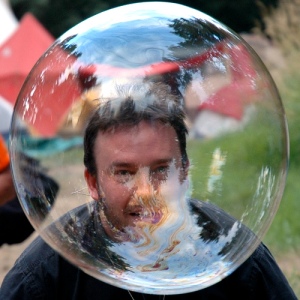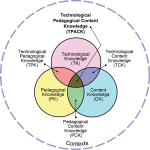This past summer in CEP 810, I was forced to sign up on Twitter. I was skeptical at the time but signing up was a requirement so I complied and joined the world of social media. I started my network by following my two professors and a few classmates that I could relate to. Thanks to Twitter’s regular suggestions of who to follow, my list grew exponentially for the first month or so. During this honeymoon time, I was exposed to countless interesting articles, tips and tools and I tried to absorb all of it as I prepared for my new role as a technology coach. I also tried to give back to this Twitter community by tweeting whenever I created blog posts, videos, tutorials, infographics, etc. While listening to Jenkins (2011) discuss participatory culture this week, I could relate to what he said about creating media to share our passions. I really have began to “geek out” (his words) about educational technology and I want to share what I am learning. In addition, Gee (2013) also helped me realize that my Twitter network has rapidly become my main affinity space as we are using Twitter to network “multiple tools, different types of people, and diverse skill sets” in ways that makes “everyone smarter” (p.174).
While affinity spaces and participatory culture can be great, I received a bit of a wake up call this week when Pariser (2011) stated that “the Internet shows us what it thinks we want to see.” (I guess that explains the large proportion of advertisements that I come across showing Saucony running shoes and beer brewing supplies!)  Now as I think back to the beginnings of my Twitter account, I see how my own Twitter “filter bubble” has developed without me thinking about it. Twitter suggests that I follow people most like me. Sometime I even decline to follow a suggestion because I feel that I would not relate to that person. Now, while I get a lot of great information through Twitter, I only hear from like-minded individuals who more than likely think the way I do. Without even realizing it, I have been lulled into the false thinking that when it comes to educational technology everyone feels the way that I do. I have been taking in an unhealthy diet.
Now as I think back to the beginnings of my Twitter account, I see how my own Twitter “filter bubble” has developed without me thinking about it. Twitter suggests that I follow people most like me. Sometime I even decline to follow a suggestion because I feel that I would not relate to that person. Now, while I get a lot of great information through Twitter, I only hear from like-minded individuals who more than likely think the way I do. Without even realizing it, I have been lulled into the false thinking that when it comes to educational technology everyone feels the way that I do. I have been taking in an unhealthy diet.
Armed with this unsettling feeling, I spent time this week hunting down additional sources of information. My first goal was to burst my Twitter bubble. While I was originally hoping to follow a few people who regularly cautioned against EdTech, I had trouble finding this. Therefore, I decided my next best option was to purposely follow areas that were underrepresented in my current network. Therefore, I choose broaden my information diet to include more than merely EdTech information and I began to follow several STEM (Science, Technology, Engineering and Math) handles such as @teachingSTEM and NGSS (Next Generation Science Standards) handles like @OfficialNGSS. While creating a more rounded Twitter network is a start, I decided that I should also be using RSS feeds to add additional sources of information to my diet. Therefore, I created a Feedly account and added RSS feeds from a variety of different areas (TED-Ed, Reddit Edtech, etc). I added these specific feeds with intentionality and hopefully they will provide a larger circle of thought. In addition, I discovered that some of these sites, such as reddit, have a “controversial” tab at the top. While this tab is a bit hit and miss, it can be a good way to learn about others opinions on a certain topic.

The more I have been studying educational technology, the more I have realized that good teaching is much more than just including technology, but rather using appropriate technology alongside solid content and pedagogy knowledge (see TPACK). After much reflection this week, I am hoping that my Internet information diet will now be a bit healthier as it incorporates all three of these areas.
References
Gee, J. P. (2013). The anti-education era: Creating smarter students through digital learning. New York, NY: Palgrave Macmillan.
Jenkins, H. (2011, August 4). Media scholar Henry Jenkins on participatory culture and civic engagement [Video File]. Retrieved from https://www.youtube.com/watch?v=ZgZ4ph3dSmY#t=29
Jones, D. (2009, February 15). The TPACK Image [Digital Image]. Retrieved from https://www.flickr.com/photos/david_jones/8538394076
Liotta, C. & Liotta, J. (2007, July 15). Colin performing the bubblehead charm [Digital Image]. Retrieved from https://www.flickr.com/photos/jessandcolin/842604931
Pariser, E. (2011, May 2). Beware online “filter bubbles [Video File]. Retrieved from https://www.youtube.com/watch?v=B8ofWFx525
Hi Dan,
I laughed when I read about you being “forced” to join Twitter in CEP 810 as I felt the same way. But like you I have also found Twitter to be a great resource for a wide-array of topics. I like how you popped the filter bubble by following NGSS and @TeachingStem. NGSS looks really interesting so I am going to follow them, too. Great job expanding your Infodiet and tying in this weeks readings to your blog post.
– Cody
LikeLike